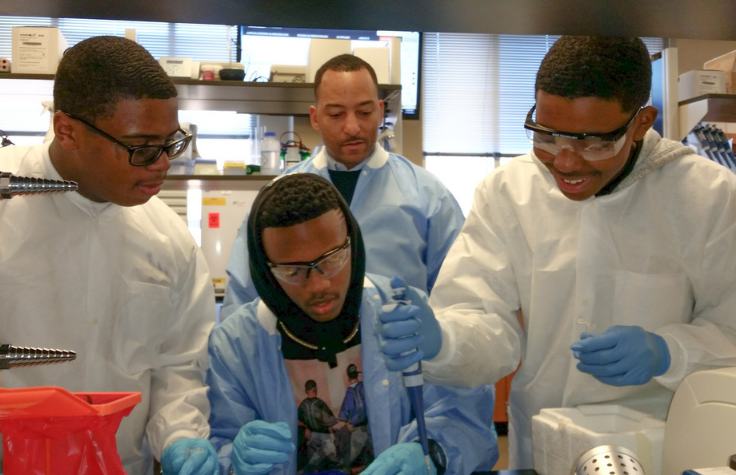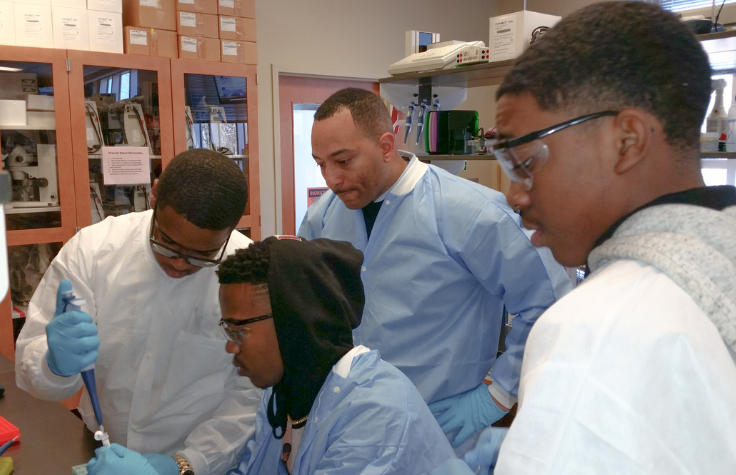
January 13, 2022
As a middle school math teacher in Woodbridge, Virginia, Dr. Arik King saw firsthand how boys of color trailed their peers in test scores, attendance, and graduation rates—part of an alarming and persistent national trend. Knowing the potential of his students, he designed an after-school program that provided focus and consistent guidance from adult mentors through engaging technology projects.
What started in 2009 as an after-school program has become Future Kings, a robust non-profit organization delivering immersive science, technology, engineering, and math (STEM) programs to middle and high school boys from underserved communities through a multi-year, hands-on curriculum, and dedicated mentorship.
“My vision for Future Kings and my ongoing commitment to the organization is to break the cycle of poverty in African American and Hispanic communities by introducing students to STEM professions,” says Dr. King, Future Kings Founder and Executive Director.
As the organization evolved, a new biomedical sciences program emerged in collaboration with Northern Virginia Community College. It helps students build technical skills; 21st century soft skills such as adaptability and collaboration; and applied learning that puts classroom knowledge to work in a real-world environment. In 2015, Dr. Tshaka Cunningham, Co-Founder and Chief Scientific Officer at Polaris Genomics, joined the Future Kings board and became a mentor. The program expanded further to provide the tools and support for life after high school.
“Our goal for the expanded program is to expose young men to cutting edge techniques in molecular and cellular biology,” says Dr. Cunningham. “It is a very exciting program because it provides hands-on job skills that give students a competitive advantage over their peers as they apply for college, internships and jobs in the future.”
“Having mentors with as much expertise as Dr. Cunningham and being enriched every other weekend is a unique experience you can’t get in school.”
Dr. Cunningham is also a graduate of the Illumina Accelerator program associated with the team at TruGenomix, now Polaris Genomics. Polaris addresses solutions for post-traumatic stress disorder (PTSD) by offering better identification of the condition and targeted, individualized treatment options.
Armed with the knowledge of Illumina’s sequencing systems and reagents, Dr. Cunningham connected the Future Kings team to Illumina in 2020 for support in building out the biomedical sciences program to include industry-leading equipment and resources that the students wouldn’t have had access to otherwise.
“We are committed to equitable access to STEM education opportunities through the support of programs like Future Kings,” says Sharon Vidal, Global Lead of Corporate Social Responsibility at Illumina. “Genomics is transforming science, and the diversity of future scientists and engineers will be critical for innovation and inclusive solutions.”
In addition to students building basic lab skills, nucleic acid structure and manipulation, cell structure and function, protein structure and analysis, drug development, and entrepreneurship, they are also able to choose the projects they work on.
In the fall of 2020, the cohort of 12 students began their capstone research project. They chose to study why African Americans are more susceptible to COVID-19. Recent studies show that certain minority communities are at higher risk for fatal COVID-19 infection. In parts of the United States, the mortality rate for African Americans was six times greater than other races, for reasons that remain unknown.
For the project, students aimed to answer this question—to uncover genes that define cellular susceptibility or resilience to COVID-19 infection utilizing Illumina’s sequencing technology. The hope is that cloning under-expressed genes from the resistant cells and introducing them into susceptible cells could help people become more resistant. Ultimately, the goal would be to use the research and documentation to help develop new gene-based treatments for COVID-19.

Over the course of the year, students learned how to perform sterile technique, pipetting technique, DNA/RNA extraction, gel electrophoresis, human cell culturing and library preparation using Illumina’s iSeq technology and related components.
“To me, Future Kings means mentorship and commitment. Having mentors with as much expertise as Dr. Cunningham and being enriched every other weekend for a few hours is a unique experience you can’t get anywhere else, and you can’t get that in school,” says Norvin West, a Future Kings graduate who has started his freshman year at Yale where he will pursue a degree in neuroscience.
Other graduates of the program have gone on to study virology, pre-med, and mechanical engineering at Johns Hopkins, Virginia Commonwealth University, and George Mason University, respectively.
Illumina is committed to STEM education for all, with the goal of empowering students to envision themselves as future scientists, innovators, and trailblazers.
To learn more about the Future Kings biomedical sciences program, click here.
Watch Future Kings students talk about their experience with the program here.


